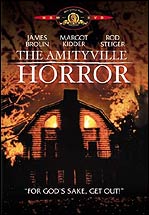New York (CNN/Money) - Any number of physical factors can complicate the sale of a home: shoddy upkeep, irreparable structural decay, proximity to a toxic waste site.

But one kind of property that causes real nightmares is a house that carries a supernatural stigma. "Psychologically impacted" houses -- in which a murder, suicide, or illness took place -- are a tough sale.
The reason: fear of ghosts.
Two business professors at Wright State University, James Larsen and Joseph Coleman, studied more than 100 psychologically impacted houses. They found that they take 50 percent longer than comparable homes to sell, and price at an average of 2.4 percent less.
Many buyers simply won't buy a house that might contain a ghost. Larsen says one broker told him about showing a couple a home where a murder had taken place.
"The broker was walking ahead of them about thirty feet into the house when he started telling them about the murder," Larsen says. "When the broker turned around, the couple had disappeared."
House BOO-tiful
Joe Nickell, a self-described ghostbuster, says he's investigated scores of hauntings over the past 30 years without ever coming face to sheet with a ghost.
Nevertheless, he agrees that supernatural notoriety nearly always lowers a home's selling price.
 |
|
| Strange, but not true |
The best-known example of a haunted house, says Nickell, is the one made famous in "Amityville Horror," a book by Jay Anson that became a popular movie.
The six-bedroom house on Long Island's south shore was the scene of a grisly quadruple murder in the early 1970s. It was bought by the Lutz family in late 1975 for the bargain price of $80,000.
The Lutzes lasted less than a month before spirits creeped them out. They left, but managed to cash in by collaborating on the book and movies, describing weird tales of cloven-hoofed footprints in snow, poltergeists, green slime, and more.
Meanwhile, another couple, the Cromartys, moved in, then unaware of the stories circulated by the Lutzes, and they experienced no supernatural phenomena.
Even so, the publicity brought a flood of curiosity seekers, dubbed "the Amityville horribles" by locals. These intruders, far more annoying than any phantom, rang the Cromartys' doorbell, wandered through their yard, and wouldn't leave.
The Cromartys sued the Luztes, saying that their claims had resulted in sightseers destroying their privacy, and won a settlement.
Exorcising at home
Three years ago, a woman who wishes to remain anonymous bought a Napa County home for $125,000 and says she began noticing strange occurrences. She claims to have heard "growling, breathing, conversation in the living room that disappeared when you went in -- doors would open and close and things would knock around."
The spooked homeowner attributes this to the previous occupant's teenage son who evidently had been experimenting with Satanism.
When she tried to sell the home recently, it sat on the market for months, even as other houses in the area sold at higher prices. People would look, but they wouldn't buy.
For help, she turned to Phantasm PSI, a psychic research organization that aims to help people plagued by apparitions. Phantasm's Dave Considine claims he rid the house of its demon by performing a suffumagation.
"I went through each room, cleansing them with fumes of frankincense, myrrh, and other incenses." The property sold shortly afterward for $185,000.
Some skeptical appraisers
Not every expert agrees that a haunting lowers home values.
Californian Randall Bell, is an appraiser sometimes called the "master of disaster," because he specializes in diminution-in-value issues (he consulted on the Nicole Brown Simpson house appraisal).
Bell says a gruesome, well publicized murder generally lowers a selling price by 15 to 35 percent.
But a ghost can even be a selling point. One haunted house in Las Vegas, Bell reports, sold several times at a premium to people looking forward to hosting phantoms.
"The people who moved in were always disappointed," he says. Ghosts never appeared.
Barry Lebow, Toronto-based author of "Selling the Haunted House, or the Impact of Stigma on Market Value," says that ghosts have the biggest impact on prices during down markets and in small towns where turnover is slow.
"I myself had a house where there was a murder," says Lebow.
When all else fails, according to Lebow, owners of small-town haunted houses have one sure way of getting rid of their house: "Sell it to someone from the city."

|

